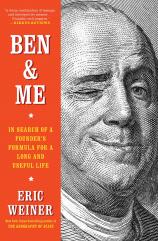Ben & Me: In Search of a Founder's Formula for a Long and Useful Life
Review
Ben & Me: In Search of a Founder's Formula for a Long and Useful Life
In books like THE GEOGRAPHY OF GENIUS and THE SOCRATES EXPRESS, former NPR correspondent Eric Weiner has led readers on sweeping physical and intellectual journeys looking for the secrets of creativity and for philosophical guidance that might point the way to a more meaningful life.
His latest, BEN & ME, is of a piece with these works, but this time he has chosen to focus on the life of one man: Founding Father Benjamin Franklin. In the story of that polymath, he hopes to find the “secret to living a long and useful life.” And in a project that’s a disarming blend of biography, memoir, travelogue and self-help, Weiner has produced a book that's both informative and inspiring.
In the Passover Seder, there’s a popular song that lists, one by one, all of the kindnesses God performed for the Jewish people, following each one with a chorus of a single word that translates to “it would have been enough,” a recognition that any one of these alone would have been sufficient. In contemplating the life of Benjamin Franklin, that’s the feeling one gets when thinking about only a partial list of all the roles he played in his many years: printer, writer, businessman, inventor, scientist, diplomat and political leader.
"[I]n a project that’s a disarming blend of biography, memoir, travelogue and self-help, Weiner has produced a book that's both informative and inspiring."
The person who founded America’s first lending library, volunteer fire company, postal service, hospital and the institution that became the University of Pennsylvania, while signing the Declaration of Independence (a document he played a crucial role in editing) and helping draft the United States Constitution, appropriately would be lauded for any one of those achievements. The fact that Franklin, a man with two years of formal education that ended at age 10, is credited with all of them is nothing short of extraordinary.
Weiner follows Franklin’s singular life from his birth in Boston in 1706 to his death in his beloved adopted city of Philadelphia in 1790 in essentially chronological fashion. He has given his chapters titles like “Empirical Ben,” “Busy Ben” and even “Buddha Ben” (yes, Weiner argues, Ben was a bodhisattva who possessed Buddha nature) to highlight the myriad facets of Franklin’s complicated, and frequently contradictory, personality. Weiner pays homage to Franklin by visiting some of the sites that played important roles in his life, including the home at 7 Craven Street in London where he spent most of his time between 1757 and 1772, and 17 Milk Street, the site of his birth, now sandwiched between a dental office and a marijuana dispensary.
As Weiner notes, one of the young autodidact Franklin’s favorite works was PLUTARCH'S LIVES, a collection of biographies of notable Greeks and Romans from the second century of the Common Era. “No ordinary history,” Weiner writes, “it is less concerned with events than with lessons gleaned from these extraordinary lives.” BEN & ME bears a certain kinship to Plutarch’s work but with an interesting twist. Instead of offering broad teachings from Franklin’s life, Weiner looks for aspects of his subject’s personality he can apply to his own behavior as he approaches the beginning of his seventh decade. Whether it’s struggling to manage his anger, dealing with his fear of aging, or, somewhat more lightheartedly, Franklin’s affinity for nudity (what he called “air bathing”), Weiner reports on the relevance of the thinking and practice of this man he suspects “just might be the mentor, the guide to aging and to living” for his own more humble life.
Despite Weiner’s unabashed affection for a man he considers “at once practical and visionary,” he’s determined not to overlook Franklin’s shortcomings. These include the fact that he enslaved seven people over the course of about four decades (though he became a committed abolitionist late in life and was appointed as the president of the Pennsylvania Society for Promoting the Abolition of Slavery), neglected his wife Deborah after she suffered the first of two strokes that ended her life, and refused to reconcile fully with his son William, the former royal governor of New Jersey who remained loyal to the British during the American Revolution.
And yet, Weiner argues passionately, we still need to “remythologize” Franklin in the sense of myths as “animating stories that inspire.” He urges us to “look at Franklin unflinchingly, flaws and all, and rather than ask whether or not he was perfect, we should pose a different question. Is the story of his long life, the good and the bad, useful? If not, move on. If yes, I think we owe it --- not to Ben but to ourselves --- to sit up and pay attention.” If Weiner was asked if we could use someone with Franklin’s talents and personal qualities in American public life at this moment, he would answer with a resounding yes.
Readers looking for a conventional modern biography of Benjamin Franklin can find an excellent one in Walter Isaacson’s 2003 book, BENJAMIN FRANKLIN: An American Life. BEN & ME is a delightfully idiosyncratic companion to that work that will have readers feeling regret when they have to leave Ben’s wise and colorful company. Few of us can hope to come close to living a life as useful and consequential as Benjamin Franklin’s, but Weiner gives us ample encouragement to at least try.
Reviewed by Harvey Freedenberg on June 14, 2024
Ben & Me: In Search of a Founder's Formula for a Long and Useful Life
- Publication Date: June 17, 2025
- Genres: Biography, History, Nonfiction, Travel
- Paperback: 336 pages
- Publisher: Avid Reader Press/Simon & Schuster
- ISBN-10: 1501129058
- ISBN-13: 9781501129056




